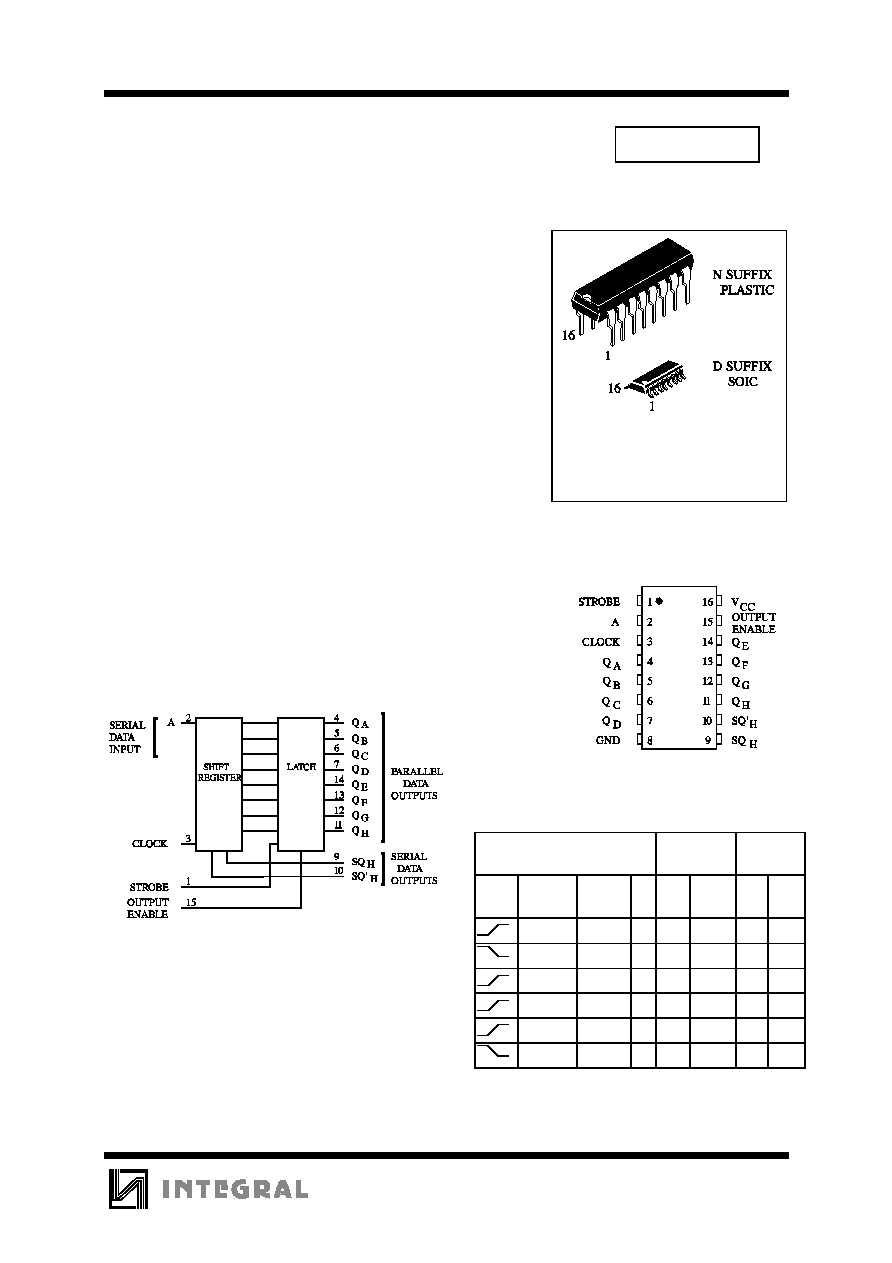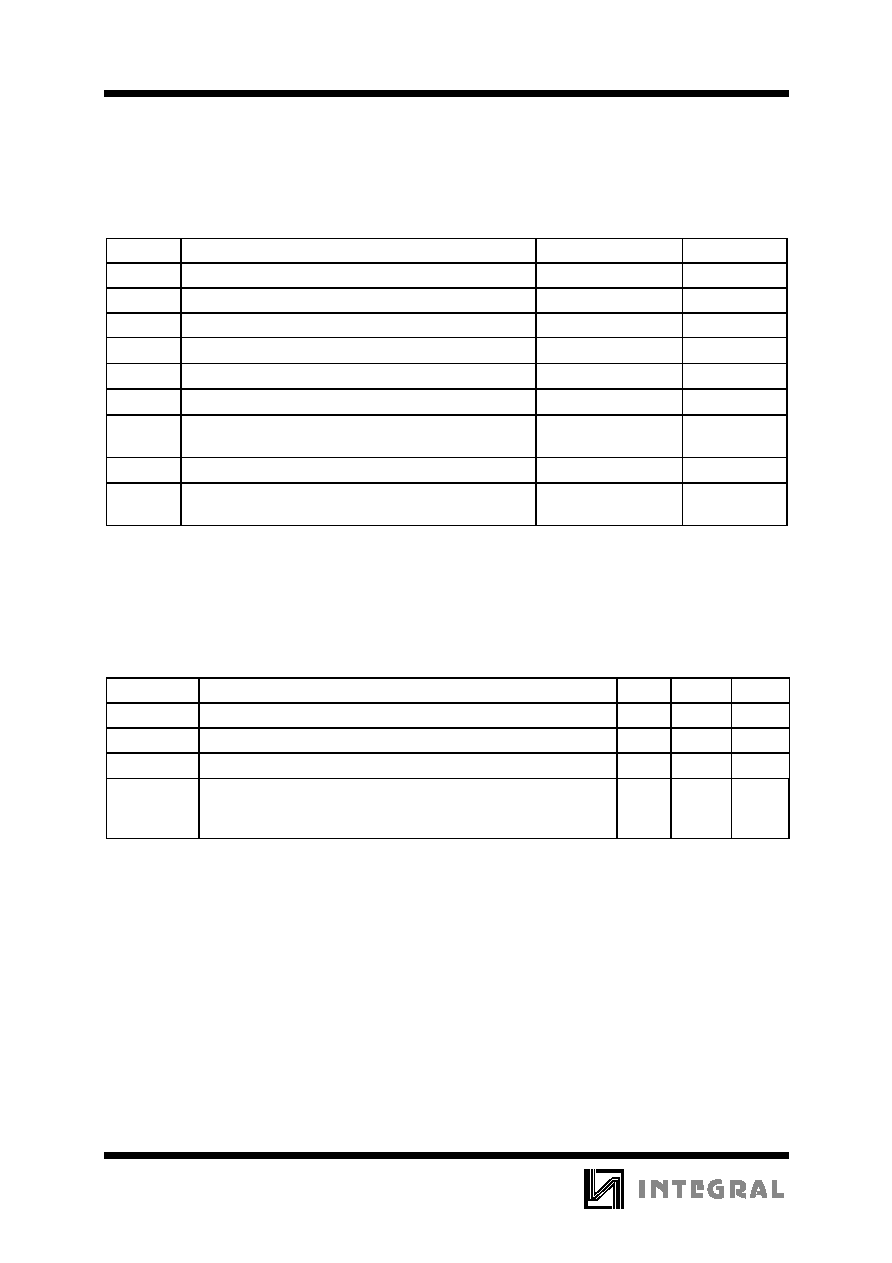
TECHNICAL DATA
515
8-Bit Serial-Input Shift Register
With Latched 3-State Outputs
High-Performance Silicon-Gate CMOS
The IN74HC4094 is identical in pinout to the LS/ALS4094. The
device inputs are compatible with standard CMOS outputs; with pullup
resistors, they are compatible with LS/ALSTTL outputs.
This device consists of an 8-bit shift register and 8-bit D-type latch
with three-state parallel outputs. Data is shifted serially through the
shift register on the positive going transition of the clock input signal.
The output of the last stage SQ
H
can be used to cascade several
devices.
Data on the SQ
H
output is transferred to a second output (SQ
H
') on
the following negative transition of the clock input signal. The data of
each stage of the shift register is provided with a latch, which latches
data on the negative going transition of the Strobe input signal. When
the Strobe input is held high, data propagates through the latch to a 3-
state output buffer.
This buffer is enabled when Output Enable input is taken high.
û
Outputs Directly Interface to CMOS, NMOS, and TTL
û
Operating Voltage Range: 2.0 to 6.0 V
û
Low Input Current: 1.0
A
û
High Noise Immunity Characteristic of CMOS Devices
IN74HC4094
ORDERING INFORMATION
IN74HC4094N Plastic
IN74HC4094D SOIC
T
A
= -55
ú
to 125
ú
C for all packages
PIN ASSIGNMENT
LOGIC DIAGRAM
PIN 16 =V
CC
PIN 8 = GND
FUNCTION TABLE
Inputs
Parallel
Outputs
Serial
Outputs
Clock Output
Enable
Strobe A Q
A
Q
N
SQ
H
SQ
H
'
L
X
X
Z
Z
Q6 NC
L
X
X
Z
Z
NC SQ
H
H
L
X NC
NC
Q6 NC
H
H
L
L
Q
N-1
Q6 NC
H
H
H
H
Q
N-1
Q6 NC
H
X
X NC
NC
NC SQ
H
NC = No Change
Z = high impedance
X = don't care

IN74HC4094
516
MAXIMUM RATINGS
*
Symbol
Parameter
Value
Unit
V
CC
DC Supply Voltage (Referenced to GND)
-0.5 to +7.0
V
V
IN
DC Input Voltage (Referenced to GND)
-1.5 to V
CC
+1.5
V
V
OUT
DC Output Voltage (Referenced to GND)
-0.5 to V
CC
+0.5
V
I
IN
DC Input Current, per Pin
20
mA
I
OUT
DC Output Current, per Pin
25
mA
I
CC
DC Supply Current, V
CC
and GND Pins
50
mA
P
D
Power Dissipation in Still Air, Plastic DIP+
SOIC Package+
750
500
mW
Tstg
Storage Temperature
-65 to +150
ú
C
T
L
Lead Temperature, 1 mm from Case for 10 Seconds
(Plastic DIP or SOIC Package)
260
ú
C
*
Maximum Ratings are those values beyond which damage to the device may occur.
Functional operation should be restricted to the Recommended Operating Conditions.
+Derating - Plastic DIP: - 10 mW/
ú
C from 65
ú
to 125
ú
C
SOIC Package: : - 7 mW/
ú
C from 65
ú
to 125
ú
C
RECOMMENDED OPERATING CONDITIONS
Symbol
Parameter
Min
Max
Unit
V
CC
DC Supply Voltage (Referenced to GND)
2.0
6.0
V
V
IN
, V
OUT
DC Input Voltage, Output Voltage (Referenced to GND)
0
V
CC
V
T
A
Operating Temperature, All Package Types
-55
+125
ú
C
t
r
, t
f
Input Rise and Fall Time (Figure 1)
V
CC
=2.0 V
V
CC
=4.5 V
V
CC
=6.0 V
0
0
0
1000
500
400
ns
This device contains protection circuitry to guard against damage due to high static voltages or electric
fields. However, precautions must be taken to avoid applications of any voltage higher than maximum rated
voltages to this high-impedance circuit. For proper operation, V
IN
and V
OUT
should be constrained to the range
GND
ò
(V
IN
or V
OUT
)
ò
V
CC
.
Unused inputs must always be tied to an appropriate logic voltage level (e.g., either GND or V
CC
).
Unused outputs must be left open.

IN74HC4094
517
DC ELECTRICAL CHARACTERISTICS
(Voltages Referenced to GND)
V
CC
Guaranteed Limit
Symbol
Parameter
Test Conditions
V
25
ú
C
to
-55
ú
C
ò
85
ú
C
ò
125
ú
C
Unit
V
IH
Minimum High-Level
Input Voltage
V
OUT
= 0.1 V or V
CC
-0.1 V
I
OUT
ò
20
A
2.0
4.5
6.0
1.5
3.15
4.2
1.5
3.15
4.2
1.5
3.15
4.2
V
V
IL
Maximum Low -
Level Input Voltage
V
OUT
=0.1 V or V
CC
-0.1 V
I
OUT
ò
20
A
2.0
4.5
6.0
0.5
1.35
1.8
0.5
1.35
1.8
0.5
1.35
1.8
V
V
OH
Minimum High-Level
Output Voltage
V
IN
=V
IH
or V
IL
I
OUT
ò
20
A
2.0
4.5
6.0
1.9
4.4
5.9
1.9
4.4
5.9
1.9
4.4
5.9
V
V
IN
= V
IH
or V
IL
I
OUT
ò
4.0 mA
I
OUT
ò
5.2 mA
4.5
6.0
3.98
5.48
3.84
5.34
3.7
5.2
V
OL
Maximum Low-Level
Output Voltage
V
IN
=V
IH
or V
IL
I
OUT
ò
20
A
2.0
4.5
6.0
0.1
0.1
0.1
0.1
0.1
0.1
0.1
0.1
0.1
V
V
IN
= V
IH
or V
IL
I
OUT
ò
4.0 mA
I
OUT
ò
5.2 mA
4.5
6.0
0.26
0.26
0.33
0.33
0.4
0.4
I
IN
Maximum Input
Leakage Current
V
IN
=V
CC
or GND
6.0
0.1
1.0
1.0
A
I
OZ
Maximum Three-
State Leakage
Current
Output in High-Impedance
State
V
IN
= V
IL
or V
IH
V
OUT
=V
CC
or GND
6.0
0.5
5.0
10
A
I
CC
Maximum Quiescent
Supply Current
(per Package)
V
IN
=V
CC
or GND
I
OUT
=0
A
6.0
4.0
40
160
A

IN74HC4094
518
AC ELECTRICAL CHARACTERISTICS
(C
L
=50pF,Input t
r
=t
f
=6.0 ns)
V
CC
Guaranteed Limit
Symbol
Parameter
V
25
ú
C
to
-55
ú
C
ò
85
ú
C
ò
125
ú
C
Unit
f
max
Maximum Clock Frequency (50% Duty Cycle)
(Figures 1 and 5)
2.0
4.5
6.0
6
30
35
5
25
28
4
20
23
MHz
t
PLH
, t
PHL
Maximum Propagation Delay, Clock to SQ
H
(Figures 1 and 5)
2.0
4.5
6.0
150
30
26
190
38
33
225
45
38
ns
t
PLH
, t
PHL
Maximum Propagation Delay, Clock to Q
A
-Q
H
(Figures 2 and 5)
2.0
4.5
6.0
195
40
33
245
50
42
295
60
50
ns
t
PLZ
, t
PHZ
Maximum Propagation Delay ,Output Enable to
Q
A
-Q
H
(Figures 3 and 6)
2.0
4.5
6.0
125
25
21
155
31
26
190
38
32
ns
t
PZL
, t
PZH
Maximum Propagation Delay ,Output Enable to
Q
A
-Q
H
(Figures 3 and 6)
2.0
4.5
6.0
175
35
30
220
44
37
265
53
45
ns
C
IN
Maximum Input Capacitance
-
10
10
10
pF
C
OUT
Maximum Three-State Output Capacitance
(Output in High-Impedance State), Q
A
-Q
H
-
15
15
15
pF
Power Dissipation Capacitance (Per Package)
Typical @25
ú
C,V
CC
=5.0 V
C
PD
Used to determine the no-load dynamic power
consumption: P
D
=C
PD
V
CC
2
f+I
CC
V
CC
300
pF
TIMING REQUIREMENTS
(C
L
=50pF,Input t
r
=t
f
=6.0 ns)
V
CC
Guaranteed Limit
Symbol
Parameter
V
25
ú
C to
-55
ú
C
ò
85
ú
C
ò
125
ú
C
Unit
t
su
Minimum Setup Time, Serial Data
Input A to Clock (Figure 4)
2.0
4.5
6.0
50
10
9.0
65
13
11
75
15
13
ns
t
h
Minimum Hold Time, Clock to Data
Input A (Figure 4)
2.0
4.5
6.0
3
3
3
3
3
3
3
3
3
ns
t
w
Minimum Pulse Width, Strobe
(Figure 1)
2.0
4.5
6.0
80
16
14
100
20
17
120
24
20
ns
t
r
, t
f
Maximum Input Rise and Fall Times
(Figure 1)
2.0
4.5
6.0
1000
500
400
1000
500
400
1000
500
400
ns

IN74HC4094
519
Figure 1. Switching Waveforms
Figure 2. Switching Waveforms
Figure 3. Switching Waveforms
Figure 4. Switching Waveforms
Figure 5. Test Circuit
Figure 6. Test Circuit




